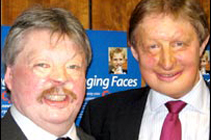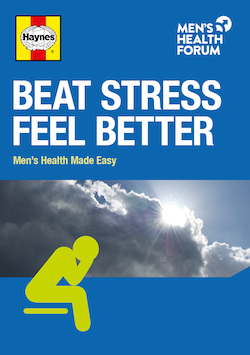'Happier than someone who looks like a Hollywood model'

James founded Changing Faces 22 years ago to support people with disfigurement of the face or other part of the body in facing their future with confidence.
You were in a car accident?
Yes, I was severely burned in a car fire in 1970. I was 18 and had 40% burns - not just on my face but other parts of my body. I was lucky as in the car behind was a trained nurse who drove me to Chepstow where the hospital had a burns unit.
I'd never thought much about disability or disfigurement and suddenly I was thrown into a very different world. I'd expected to find lots of support and help but really, after the surgery, there was very little. I wanted to do something but it wasn't until the 1980s after the major fires at Bradford football ground and Kings Cross that I had the chance.
You wrote a book called Changing Faces. How was it received?
It was a self-help manual really. What are the lessons to be learned? What are the strategies for managing other people's reactions? But there was a lot of interest from surgeons and psychologists because it answered some of the questions they'd been struggling with.
The organisation Changing Faces followed naturally. I knew from my personal experience and from the research that regardless of the cause people with facial disfigurements faced exactly the same challenges.
The initial idea was to provide self-management programmes to empower people with the social skills they needed but it flowered into workshops, one to one sessions, guide books, videos and so on. The numbers are not recorded but it's estimated that there are around 410,000 people with a significant facial disfigurement — over 6,000 have been directly involved in our training programmes. Gradually, as I had hoped, we managed to broaden our agenda to advocate for better health care and to campaign for greater public awareness and civil rights too.
You successfully campaigned for disfigurement to be included in the 1995 Disability Discrimination Act. What other recent changes have pleased you?
Individuals and their families definitely have more sources of information and support now than in the 1970s. The internet has opened that up further and there are also excellent impairment-specific organisations such as the Cleft Lip and Palate Association.
Health care professionals have learned a lot too. They increasingly recognise that they cannot neglect the psychological and social dimension both for patients and their families — and they have now got many more ways to address these issues, not least because of our programmes. I believe we've also helped to raise public awareness.
In our image-obsessed world is it more difficult to live with a facial disfigurement?
I think the current obsession with body image makes our work even more interesting. We're suggesting ideas that are challenging the collective headset. Journalists are incredulous when I tell them that you can have a facial disfigurement and still be happier than someone who looks like a Hollywood model — but it's true!
Frequently, we've seen teenagers who are living with a disfigurement having more self esteem than their peers because they believe in and understand themselves, and have developed their social skills and talents.
Changing Faces now has a Young People's Council for 11-21 year olds to enable young people to have a voice and help to develop our services. They have recently been involved in creating a young people's website iface which enables them to discuss issues around disfigurement, swap tips and share personal stories with other young people.
But they still face discrimination.
Yes - there's no question that it is still more difficult for someone with a disfigurement to get a job. Equally important is the issue of access to goods and services. To be barred from a leisure centre, swimming pool or restaurant because of a disfigurement is a horrible experience. We know of several cases that have been settled out of court but we still need the cases in court. But we understand how very difficult that is for individuals to do.
Some people say disfigurement is the last bastion of disability. You may not change an individual's notions of beauty but you can change the importance they attach to them. More and more people want to escape from the shackles of narrow modern ideas of beauty and the idea that only cosmetic surgery can make you happy.
Would you rather your car crash hadn't happened?
I wouldn't want to go through the pain again if I could avoid it but in terms of the learning, the insight, the fulfilment, the love and the comradeship I've had in my life since, I don't think I could beat it. I'm very attached to my face. I wouldn't want to have had any other now.
- Changing Places which celebrates it 22nd anniversary this year has an excellent website.
- Nearly 40 years later, James is still in touch with the nurse who drove him to hospital after the accident.
- James Partridge (Right) pictured above with Falklands war veteran Simon Weston (Left) who is a patron of Changing Faces
- A longer version of this article first appeared in New Bulletin, the magazine of the UK's leading disability organisation Disability Rights UK and is reproduced with their kind permission.
Page originally created on June 7th, 2007
| This article reflects the experience of the individual. It is not health information from the MHF under the terms of the NHS England Information Standard. It was last updated in 2014. |
|
The Men’s Health Forum need your support It’s tough for men to ask for help but if you don’t ask when you need it, things generally only get worse. So we’re asking. In the UK, one man in five dies before the age of 65. If we had health policies and services that better reflected the needs of the whole population, it might not be like that. But it is. Policies and services and indeed men have been like this for a long time and they don’t change overnight just because we want them to. It’s true that the UK’s men don’t have it bad compared to some other groups. We’re not asking you to ‘feel sorry’ for men or put them first. We’re talking here about something more complicated, something that falls outside the traditional charity fund-raising model of ‘doing something for those less fortunate than ourselves’. That model raises money but it seldom changes much. We’re talking about changing the way we look at the world. There is nothing inevitable about premature male death. Services accessible to all, a population better informed. These would benefit everyone - rich and poor, young and old, male and female - and that’s what we’re campaigning for. We’re not asking you to look at images of pity, we’re just asking you to look around at the society you live in, at the men you know and at the families with sons, fathers and grandads missing. Here’s our fund-raising page - please chip in if you can. |



